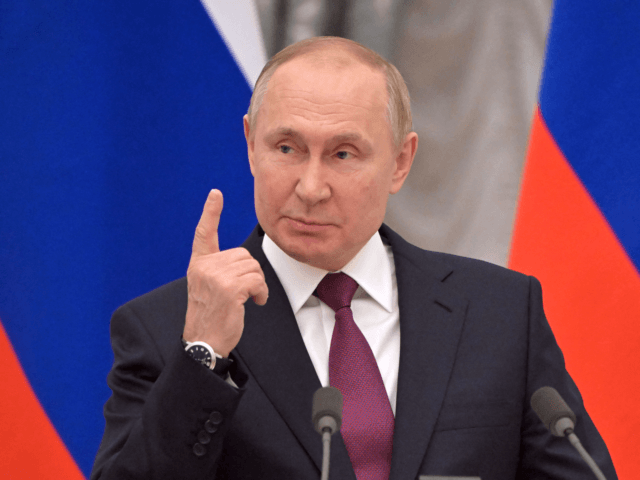Russian leader Vladimir Putin has issued a demand that “unfriendly” countries purchase natural gas in rubles rather than dollars or euros in an apparent attack against America’s global hegemony through the petrodollar and the international sanctions levied against Russia’s central bank.
Speaking before a cabinet meeting in Moscow on Wednesday, the embattled Russian strongman said that his government will no longer accept “compromised” currencies, such as the dollar or the euro, from countries that have levied sanctions in response to his invasion of Ukraine.
“I made the decision to implement within the shortest possible time the package of measures to transfer payments — we will start with that — for our natural gas supplied to the so-called ‘unfriendly’ states to Russian rubles,” Putin said per the Moscow Times.
“It doesn’t make sense to deliver our goods to the EU or U.S. and receive payments in dollars or euros,” he added.
The move is largely seen as a retaliatory strike in response to sanctions levied against the central bank of Russia, as well as the United States and EU taking the unprecedented move to freeze Russia’s international reserves, an estimated $300 billion mostly in dollars that Moscow had previously seen as an insurance policy should it be cut off from the international financial system.
Should Putin follow through with the threat, it would force European nations to purchase hundreds of millions of euros worth of rubles per day in order to cover the costs of its hefty gas imports from Russia, thereby propping up the struggling currency, which fell substantially after the invasion of Ukraine and the subsequent enactment of Western sanctions.
Russia’s demand for payment in rubles comes amid growing concerns about the fate of the ‘petrodollar’, a system in which oil is only traded on the global market in American currency. Saudi Arabia, for example, has signalled that it may be willing to begin accepting the Chinese RMB in exchange for oil, a move that could potentially upend America’s position as the supreme power in the world.
The petrodollar has been a staple of the global economy since 1973 when U.S. President Richard Nixon — who took America off the gold standard — made a deal with Saudi Arabia to only trade oil in U.S. dollars, a move that was quickly adopted by the Organization of the Petroleum Exporting Countries (OPEC).
By forcing the world to trade oil in dollars, the U.S. not only massively increased its sway over other countries but also prevented inflation by forcing other countries to hold dollar reserves and therefore limit the supply of notes in circulation.
Should Saudi Arabia and other major oil producers follow Russia’s lead, it could result in massive dumping of dollars on the world stage, spelling potential doom for the American economy and indeed the possible end of its post-Second World War era of global domination.
While Russia’s decision to demand “unfriendly” nations purchase gas in rubles is not a full-scale attack on the petrodollar, it will put the U.S. and its allies, notably Germany, in a tough position.
In response to Putin’s announcement, German economy minister Robert Habeck accused Russia of a “breach of contract” and said that his country will “discuss with our European partners how we would react to that.”
It remains to be seen, however, what leg Germany will be able to stand on in a contract dispute, given its moves to block the Russian-German Nord Stream 2 gas pipeline and to ship weapons to Ukraine, breaking a longstanding tradition of not sending arms to conflict zones.
Though Russia is heavily dependent on gas sales to Europe, Germany is also heavily dependent on Russian gas. Indeed, prior to the invasion of Ukraine, the European Union’s economic powerhouse imported 55 per cent of its natural gas from Russia.
Prior to the announcement from Putin on Wednesday, Germany’s Chancellor Olaf Scholz told the country’s parliament (Bundestag) that while his government is looking to secure other energy sources, cutting off Russian gas imports immediately would send “our country and all of Europe into a recession”.
“The truth is that the sanctions that have already been decided also hit many citizens hard, and not just at the gas pump,” Scholz said, adding that sanctions “must not hit the European countries harder than the Russian leadership.”
Germany recently agreed to a deal with Qatar to begin importing gas from the Islamic kingdom, however, as there is currently no pipeline infrastructure to expedite this, the gas will likely be needed to be transported by the sea.
Germany does not currently have the infrastructure at its ports to accept large amounts of natural gas, and the German government has said that such installations won’t be operable until 2026.
The quandary that Germany finds itself in demonstrates the pitfalls of the country’s attempts to transition to a green economy while still dependent on hostile powers to keep the lights on. The situation also renders Germany’s ability to conduct foreign policy somewhat limited.
Ukraine’s foreign affairs Minister Dmytro Kuleba has complained that “If any EU country bows to Putin’s humiliating demands to pay for oil and gas in rubles, it will be like helping Ukraine with one hand and helping Russians kill Ukrainians with the other. I urge relevant countries to make a wise and responsible choice.”
Follow Kurt Zindulka on Twitter here @KurtZindulka

COMMENTS
Please let us know if you're having issues with commenting.